Coaching Quote of the Day 6th September 2013
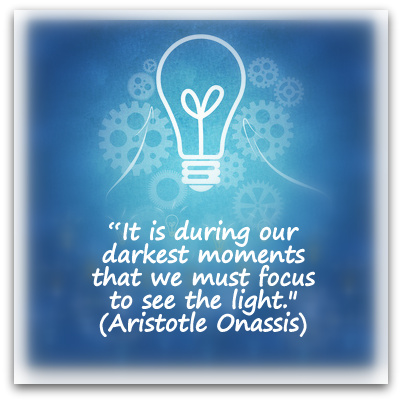
“It is during our darkest moments that we must focus to see the light.”
(Aristotle Onassis)

“It is during our darkest moments that we must focus to see the light.”
(Aristotle Onassis)
In today’s guest post leadership trainer and coach Brian Lumsdon looks at:
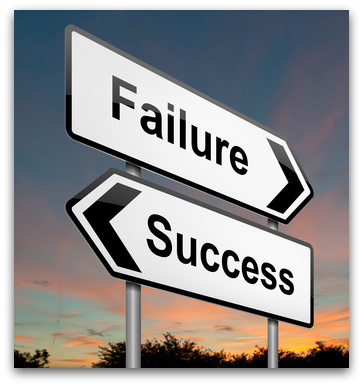
Now this might just be me, but don’t you think there’s a feel good factor around Britain again this summer? Perhaps it’s the prolonged spell of wonderful weather and maybe Andy Murray’s victory at Wimbledon has influenced the nation’s mood. Whatever the trigger, I sense an air of positivity amongst friends, family and the people I work with across the country.
So with this in mind you might be curious as to why I’ve chosen to talk about the topic of ‘failure’ today! It’s a subject that’s crept in and out of my thinking since the start of this summer, encouraged by some notable sporting successes and the role their ‘failures’ played in the success they enjoyed. So stay worry-free, I’d simply like to share my take on how we might embrace failure and help our clients do the same.
A seed was sown during a lecture I attended by Olympic swimmer Chris Cook, a commonwealth gold medallist. To the backdrop of a screen full of events and dates, Chris shared numerous ‘failures’ he had experienced over a five year period. The Olympics he missed because selectors thought he wasn’t good enough, the championships where he didn’t make the qualifying time. He explained to the audience with so much passion that he was as proud of these moments as he was about actually winning commonwealth gold medal.
To be more specific, he was as proud of himself when thinking about these moments of failure in the context of his focus.
I know we are often conditioned to a culture of deleting the negatives and accentuating the positives to achieve success. I do believe this can be really useful. But there seems to be something liberating, even energising, about acknowledging a failure and just continuing in the direction of our focus. I’ve used the word ‘focus’ here. You may prefer to describe this as your purpose, goal or best intention.
“Our greatest glory is not in ever falling, but in rising every time we fall” Confucius.
My summer failure-theme was cultivated by Justin Rose, who in June became the first English golfer to win the US Open for 43 years. In one of his post-tournament interviews he recounted the fact that when he first became a professional golfer Justin missed the cut TWENTYONE times in a row. (In these four day tournaments, ‘missing the cut’ means a player failed to reach a qualifying standard after the first two days and is therefore removed from the competition).
“If I missed the cut by six shots one week and by four the next, I would spin it in a positive light. I didn’t drill myself further into the ground.” said Rose. He also went on to say that days like that help remind him that winning is even more special.
So for some people, like Chris, just to understand our reaction to failure is in our own hands is enough. The fact we know we are in choice allows a more resourceful thought or reaction to appear without having to work at it. Others, like Justin, greatly benefit from spending a few moments cultivating a useful meaning or philosophy.
Throughout my coaching career I’ve worked with clients who have become stuck or even crippled by their own thinking of a failed event. This has applied to job interviews, delivering presentations, working with sales targets, relationships, parenting and countless other examples I could mention.
I’ve noticed that two patterns of thought typically play out for clients, often unconsciously, after an event that didn’t go to plan. They often get stuck in either the ‘what if…’.or ‘blame’ patterns of thinking.
Either way, these thought patterns create a negative state of mind and affect our entire physiology. And of course from this unresourceful state it is little wonder we either don’t perform next time or we do everything in our power to avoid the same situation next time.
Benjamin Zander, Conductor of the Boston Philharmonic Orchestra and Leadership guru, insists his students use a novel approach whenever they make a mistake. Their natural tendency would be to cringe, perhaps slouch into their seat and look to the floor. Instead he has them jump up, fling their head & shoulders back and shout ‘HOW FASCINATING’. Now which of these two responses do you think helps the student smile and quickly move on?
You see, if there is no blame or shame attached to a failure, no holding on to negative thought of an experience, we are free to head towards better results.
“It’s fine to celebrate success but it is more important to heed the lessons of failure” Bill Gates
My failure-themed summer concludes with Andy Murray’s glorious success at Wimbledon. I’d imagine the majority of people reading this will know he was the first Briton to win the men’s title for 76 years.
In a radio interview shortly after his Wimbledon success his biographer told how the way Andy had kept hold of his past failures was something he had discussed in depth with his coach, Ivan Lendl. ‘Take what you want to learn and move on’ became a bit of a mantra for them. Andy also caused a bit of a stir in a pre-tournament interview this year when he admitted he may never win the Wimbledon championship. While this was hard to hear for many at the time, his biographer said this admission seemed to be a liberating and pivotal moment for the player.
“The greatest mistake you can make in life is to be continually afraid you will make one”
Elbert Hubbard
So here is an approach I’ve found to work really well for myself and clients recently, helping us embrace failure. You might want to adapt them to your own style or try them out for yourself as they are.
Brian Lumsdon is a leadership trainer and coach with TwentyOne Leadership and has created lasting change in diverse organisations over the last 15 years.
Brian specialises in helping business leaders create a high-performance coaching culture. He develops an organisations capability to coach their people brilliantly well.
You can contact Brian via e-mail ( br***@*****************ip.com) or connect via Twitter (@brianlumsdon) or LinkedIn (uk.linkedin.com/pub/brian-lumsdon/38/824/735/)
In this week’s guest post Marie Yates, The Survivor’s Coach, invites you to consider…

By Marie Yates
Essentially, you’re born and stuff happens. Some good stuff and some not so good stuff. There’s a high chance I’m over simplifying but this is the stuff that happens ‘to’ you, the stuff you’re handed. There’s no rhyme or reason, it just is what it is. There can be a tendency to dwell on the not so good stuff though can’t there?!
What about the rest of the ‘stuff’?! In the spirit of over simplification let’s make a list of the good stuff versus the not so good stuff in the average day. I’m not necessarily talking about major life events as these don’t happen every day – not to me anyway! Yet, how often does a major life event take over our thinking?
So, the list… Here’s mine so far today – it’s still early!
Good Stuff:
Not So Good Stuff:
Without even trying I’m up 4:1 on the good stuff! Not bad hey? I grant you that these are hardly life changing events but they are all things that have ‘happened’ today. If I had rolled out of bed & only concentrated on the fact that ‘bad stuff always happens’ and to prove this I had been woken up at silly o’clock then I can guarantee that a grumpy day would have ensued. I’d have ignored my favourite song, been annoyed on the walk, found the text a little irritating and complained that there weren’t any fried eggs in the packet of haribo! What a waste of a day that would have been!
Even on the days where the not so good stuff is at the forefront of your thinking. Ask yourself ‘What Am I Choosing To Focus On Right Now?’ Keep it simple and allow yourself to enjoy the little things! Open your eyes to the good stuff and I guarantee that more will come your way!
Marie Yates, ‘The Survivor’s Coach’, is the founder of Indigo Turtle.
Taking the experience of rape and sexual violence and using it to create a catalyst for positive change is something that seemed impossible. Marie has shown that it is not only possible; it is changing the way that survivors see themselves and the way that survivors are seen by others.
Through a variety of ways, Marie looks at what it means to be a ‘survivor’ and then takes it to the next level. Looking to the future and exploring what can be achieved gives a renewed enthusiasm for achieving success as defined by YOU!
Follow Marie on Twitter here.
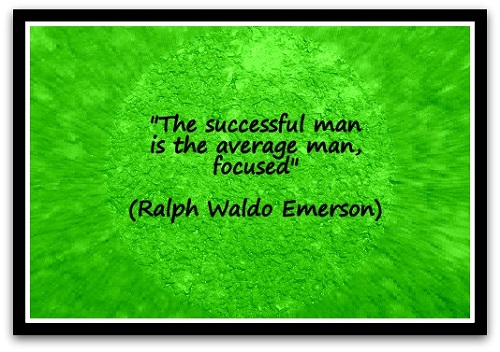
“The successful man is the average man, focused.”
(Ralph Waldo Emerson)
What advice would your clients give coaches? In today’s guest post Richard Nugent shares:

In preparation for this article, I thought I’d ask some of my coaching clients what they wanted and needed from a coach most of all. Some answers surprised me, some I completely expected and, while I hope all are factors that you already take into account when coaching, they are all great reminders of good coaching practice.
To give you a flavour, the clients I asked included several Executives of large organisations, various entrepreneurs, a professional footballer, a senior training manager, some business coaches and teacher. I have coached all of them for some time and all are pretty demanding of themselves and their coach!
I asked them all the same question ‘what is the single most important thing that a coach must do’? Here are the seven most common answers.
1. Keep in touch. Whether between sessions or during breaks in the coaching relationship. The coaching relationship must be on going and consistent even when the actual coaching isn’t.
2. Focus on helping me to understand how I can achieve my outcomes. Everyone is different; don’t assume that there is a right way for everyone.
3. Be you. A coaching relationship works best with you feel the coach is being themselves. Don’t be one way when we meet then turn into a different person when you coach.
4. Be respectful of the trust and investment that I am making in you. I am likely to be telling you things that I haven’t told my closest family. I may have also spent my whole development budget for the year with you. Occasionally let me know that you appreciate that.
5. Know when to be really tough with me and kick my butt and when to support me. (I’d call this emotional intelligence – what is clear from clients’ responses that we have to have it on full in every session. One client even used the phrase “don’t be too nice, I’m not looking for a friend, I’ve got plenty of those.”)
6. Keep asking great questions. Make me think differently to how I am now. Also keep asking me great, different questions – I never know what is coming next and that keeps me on my toes.
7. Keep developing. Clients love the fact that I am always learning and they feel that they are getting the benefit of that. This answer was especially prevalent in clients whose development budgets were tight.
These were the top seven, most consistent answers. Some clients felt really strongly about other things, including technical knowledge, business acumen (if you’re helping me build my business, yours should already be more successful) and even the size of network I have.
What occurs to be is that if this is a representation of the important thoughts my clients have, focussing on them is going to help me be a great coach for them and many others.
Richard is the M.D. of Twenty One Leadership and has coached talented people from the fields of sport and business for the last decade. Clients have credited him with everything from million pound transfers to the creation of new market leading organisations. The return on investment from his programmes stretches into the millions of Pounds, Euros and Dollars.
How do you describe what you do so that your ideal clients easily understand?
In today’s guest post, originally published online at The Times of India, Meeta Sengupta describes mentoring for teachers in India.
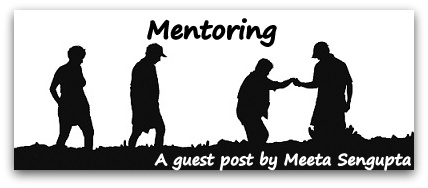
Everybody needs a pat on their back. From time to time, everybody needs to be able to talk to somebody more knowledgeable, more experienced and more philosophical. Sometimes because one needs a little encouragement, sometimes to renew the faith in oneself. Often one needs a more experienced hand to help us decide direction. More often than not, it is simply because we need to know that somebody is listening and somebody cares. In this competitive world, it is a relief to find some one who is objective and invested in our success.
Mentors help us with our existential questions, but do not answer them for us. They are there for us both as a sounding board and with handy advice when we tackle our classic stage of life questions: What should we do next? How should we do it? What pitfalls can we envisage and try to avoid? Mentors have the experience and the networks to help us reach farther than we can on our own. They are essential for fledgelings, or for any change or ‘lift off’ stage of life. Mentors are our booster shot in life.
Indian culture, and for that matter many other traditional cultures have mentorship built into the warp and weave of life. Our Guru Shishya parampara was not merely the relationship between teacher and student. The Guru is a mentor, often for life. One relies on the gurus, goes back to them in times of need. Sometimes just to rest, sometimes to lean back, often just to feel safe from the battering that one may receive at work. One comes back renewed, refreshed and ready for the next challenge – and if the guru is skilled, one does not even know how it happened. Then, just the thought that the door of the guru is always open is a resource, a source of strength.
As teachers, we are often mentors to our students, though maybe not to all of them. For those who we mentor, a little nudge here, the right questions asked at the right time, a little mental exercise, a challenge set and achieved – these are some of the tools we use everyday. Students may not even realise they are being mentored. The most elegant mentoring is subtle. Parents are mentors too – but their emotional engagement in the child’s success impairs their mentoring. There is little room for strong emotions in mentoring.
Teaching could be a lonely place, and teachers, more than any other profession need a mentoring network to keep them on track. Much of teaching, in practice is about talking to students, holding one’s own in the staff room and looking invincible. That is exhausting – we know it. All leaders know this, and just like in the corporate world, teachers too need renewal and support.
The best teachers are those who set up self renewal mechanisms. They have senior teachers as mentors. They build relationships full of affection and respect inside their classes. In the staffroom they are able to give and receive advice with no loss of face, because it is between peers. The feedback loops here are constructive and therefore effective. Some people seem to do this naturally, others watch and learn. The ones who watch, learn and then pass it on are those who build institutions.
Mentoring should be a part of the formal role of seniors in organisations and must be kept separate from the reporting relationships or from appraisal networks. This is very difficult in small places. In schools senior teachers and head teachers should have formal mentoring responsibilites – a duty of care in addition to the duty of sight. Formal mentoring would mean allocating time and resources to regular sit down sessions, phone/email conversations and interventions. A mentor has a duty to look out for their charges. Informal mentoring networks look easier but depend too much on personalities. Those who are shy or reclusive often miss out on the potential for growth. Mentoring networks, whether senior or even peer networks do not happen automatically, they need building and nurturing
We seek mentors for advice, but when they give it, it can be difficult to take. Traditional and untutored mentoring can be oppressive too. It is a skilled mentor who guides but does not stifle. It is an extremely lucky person who finds a good mentor. It is a wise person who seeks many mentors and learns from each. And, it is a silly person who takes their mentors for granted. Mentoring others is hard work and takes time away from one’s own life and interests. The rewards are few – satisfaction and the joy of making someone else successful. Within corporates the worth of mentoring has been appreciated and forms part of the formal role, but even then much depends upon the goodwill of the mentor. It is often a one way street. All the more reason for the person receiving support (I am not fond of the word – mentee) to respect the time and effort put in by the mentor in their success. The input is such a treasure that thanks are inadequate, often payment inappropriate.
Does everybody deserve a mentor? We may think so, but would the mentors agree? There is a story in hindu mythology that speaks of a time when Shiva, the most perfect performer would not perform until he found the perfect audience – Vishnu. So it is with mentors, as with gurus. They know that some people benefit more from their inputs. With some people stronger bonds are created, and with the common cause comes a more successful partnership. Mentors seek that, because that is their main reward.
Finally, can mentoring be taught? Is it a skill or a talent? Both of course, but more of a skill – thus the tools can be taught. Most people can give advice, not all can be mentors. Mentoring involves self discipline, objectivity and the ability to eliminate oneself from the discussion. At the same time, mentoring need not be a complex process – sometimes all it takes is a warm hug, virtual or real. From time to time.
Meeta Sengupta is an educator and advisor specializing in business education, cross border skill development, and coaching and mentoring. She has worked in a range of sectors including commercial banking, investment banking, publishing, education and skills development. She has strong research, teaching and leadership skills honed through many years of experience in academia, corporate, and multilateral organizations. Meeta currently runs an enterprise that supports various projects across the sector including Words and More (writing by children), a knowledge sharing platform for educators and supports self –organised efforts of the educators in Higher Education as part of her role as chairperson of the North India chapter of the Higher Education Forum.
Follow Meeta on twitter (@Meetasengupta)
In today’s guest post Sara Maude shares her thoughts and expertise on what some view as an everyday part of modern life:

by Sara Maude
Have you ever wondered why you sometimes find yourself making slow progress with a coaching client? Despite asking the most thought provoking questions or using the finest honed techniques, you still find nothing works?
Before you begin to ponder on your own skills and competency as a coach, stop and ask yourself this question; ‘is it possible my client is stressed?’. If the answer is yes, then you can stop looking in the local jobs section for a new career.
When a person is stressed no amount of coaching will have an effect unless you have the ability to calm an overworked ruminating mind down.
Stress impacts people on many levels and put simply in a coaching context, it stops a person being available for change. The lights may be on, but no-one is home.
Stress isn’t something that ‘happens’ to us, it triggers only through the basis of our perception to it. So what one client may perceive in a situation to be stressful and a handful to deal with, to another it may be water off a ducks back.
The stress response is also known as the ‘fight and flight’ response. It is hardwired into us and when triggered at the right time, keeps us safe. Unfortunately our brain doesn’t know the difference between imagination and reality so the fight and flight response will trigger based on our perception of what is dangerous. This could be a man with a knife at your throat, or a presentation to the board of directors.
When the fight and flight response is triggered a rapid number of bodily changes take place. All major organs not required in the moment shut down; the body floods with cortisol, the stress hormone, the adrenal glands go into over drive and the body gets ready to fight or take flight. Together with this, the thinking brain shuts down and all bodily responses become primordial.
What does this mean for you as a coach? It means that when the thinking brain shuts down, a client is incapable is taking in any information; they will struggle to process your words and the meaning of them and as for creative thinking, well forget it.
80% of the clients I see as a therapist have some form of stress related disorder, so the chances of you working with a stressed client are extremely high. The stress response was only ever meant to be a short term. Back in our evolutionary days when we were hunter gatherers it triggered to prevent us from being eaten alive in the jungle. Despite being able to forage for food in the local supermarket the ‘dangers’ we face in today’s modern world come in the form of taking on a new job, having to do a presentation or having a tricky relationship with your boss as examples. Modern day life is also seeing people remaining in prolonged periods of stress which in turn impacts on the bodies physical and mental wellbeing.
Stress has many guises and to some people it may not even be apparent that they are stressed accepting it instead as a way of life, but there are some key signs you can look for in a coaching session;
One of the key interventions to overcoming stress is to calm down and focus the mind of your client which will be on overdrive. A simple way of doing this is to get the client to do some 7/11 breathing. Breathing in for the count of 7 and out for the count of 11 triggers the parasympathetic side of the nervous system, which is also the relaxation response. Get your client to imagine that their stomach is a balloon and as they breathe in for the count of 7 it fills with air and as they breathe out for the count of 11 it deflates. Do this approximately 7 – 10 times and get them to notice just how much calmer they feel afterwards.
It may feel to some of your clients that stress is part of modern day life and should be accepted. Whilst we all experience a degree of stress now and again, long term if it isn’t dealt with, stress has an overwhelming impact on the body and is currently the number one reason for absence in the UK and the underlying reason of over half of medical conditions. Getting your client to acknowledge that they are stressed and need a helping hand is a major step in the right direction. It is also important to normalise why they may be feeling this way so that they recognise that stress is a subconscious response based on their bodies own survival mechanism and it doesn’t mean that they are not capable of managing their life or work.
Look at what your client is doing to switch off and have down time. Our ability to deal with stress comes from our spare capacity. We can create more spare capacity by taking time out on a regular basis to relax. When we do this we create space in the mind and body allowing us to deal with situations calmly and rationally, to think clearly, to tune into our instincts and to remain in control of our emotions.
Finally, know where you should and shouldn’t go. Be aware of the boundaries between coaching and therapy and know when it is time to suggest alternative interim support for your client. There may be underlying issues which need to be addressed in a way that only therapy can provide. Solution focused psychotherapy and hypnotherapy can clear stress and stress related disorders, including post traumatic stress in two to three sessions. A good therapist will also teach your client key coping strategies to prevent them from getting stressed in the future.
 Sara is a Brighton based hypnotherapist & psychotherapist who provides problem-free therapy which connects people with their inner resources and goes deep into the unconscious mind to create powerful change. Sessions are available on a one to one basis or through Skype. www.saramaudehypnotherapy.com
Sara is a Brighton based hypnotherapist & psychotherapist who provides problem-free therapy which connects people with their inner resources and goes deep into the unconscious mind to create powerful change. Sessions are available on a one to one basis or through Skype. www.saramaudehypnotherapy.com
You can Find Sara on Facebook at www.facebook.com/Sara.
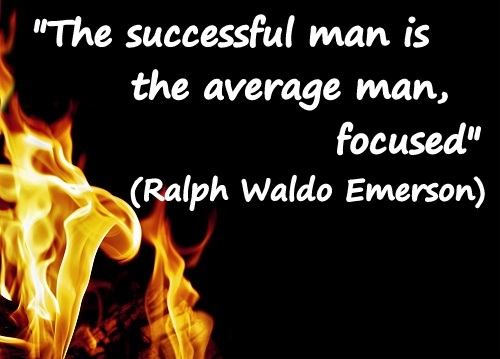
“The successful man is the average man, focused.”
(Ralph Waldo Emerson)